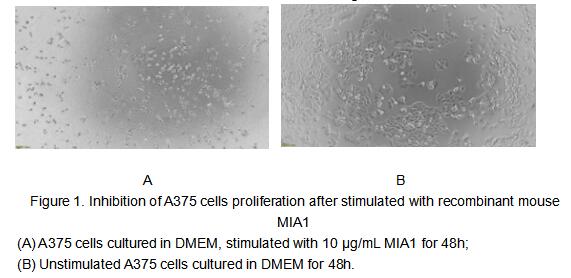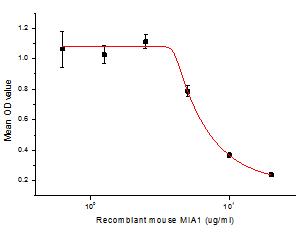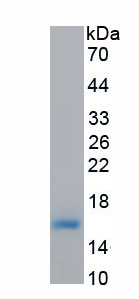Active Melanoma Inhibitory Activity Protein 1 (MIA1) 

CD-RAP; Melanoma-derived growth regulatory protein
- UOM
- FOB US$ 368.00 US$ 920.00 US$ 1,840.00 US$ 5,520.00 US$ 13,800.00
- Quantity
Overview
Properties
- Product No.APH650Mu01
- Organism SpeciesMus musculus (Mouse) Same name, Different species.
- ApplicationsCell culture; Activity Assays.
Research use only - DownloadInstruction Manual
- CategoryImmune molecule
- Buffer FormulationPBS, pH7.4, containing 0.01% SKL, 5% Trehalose.
- Traits Freeze-dried powder, Purity > 95%
- Isoelectric Point7.9
Sign into your account
Share a new citation as an author
Upload your experimental result
Review

Contact us
Please fill in the blank.
Activity test

Melanoma inhibitory activity (MIA), also known as cartilage-derived retinoic acid-sensitive protein (CD-RAP), is a 12-kDa protein that is secreted from both chondrocytes and malignant melanoma cells. MIA has been reported to have effects on cell growth and adhesion, and it may play a role in melanoma metastasis and cartilage development. In the presence of MIA, we observed enhanced migratory ability of melanocytic cells, induction of melanoma-associated genes as well as inhibition of apoptosis due to anoikis.
To test the effect of MIA1 on cell apoptosis, A375 cells were seeded into triplicate wells of 96-well plates at a density of 4,000 cells/well and allowed to attach overnight, then the medium was replaced with various concentrations of recombinant mouse MIA1 diluted with 5% serum standard DMEM. After incubated for 48h, cells were observed by inverted microscope and cell viability was measured by Cell Counting Kit-8 (CCK-8). Briefly, 10 µl of CCK-8 solution was added to each well of the plate, then the absorbance at 450 nm was measured using a microplate reader after incubating the plate for 1-4 hours at 37 ℃. Apoptosis of A375 cells after incubation with MIA1 for 48h observed by inverted microscope was shown in Figure 1. The result of cell viability assessed by CCK-8 was shown in Figure 2. It was obvious that MIA1 significantly decreased cell viability of A375 cells. The ED50 of recombinant mouse MIA1 is 5.94 ug/ml.

Figure 2. Inhibition of A375 cells proliferation after stimulated with recombinant human MIA1
Usage
Reconstitute in 10mM PBS (pH7.4) to a concentration of 0.1-1.0 mg/mL. Do not vortex.
Storage
Avoid repeated freeze/thaw cycles. Store at 2-8°C for one month. Aliquot and store at -80°C for 12 months.
Stability
The thermal stability is described by the loss rate. The loss rate was determined by accelerated thermal degradation test, that is, incubate the protein at 37°C for 48h, and no obvious degradation and precipitation were observed. The loss rate is less than 5% within the expiration date under appropriate storage condition.
Increment services
-
 BCA Protein Quantification Kit
BCA Protein Quantification Kit
-
 Molecular Mass Marker for Protein
Molecular Mass Marker for Protein
-
 Monoclonal Antibody Customized Service
Monoclonal Antibody Customized Service
-
 Polyclonal Antibody Customized Service
Polyclonal Antibody Customized Service
-
 Protein Activity Test Experiment Service
Protein Activity Test Experiment Service
-
 Electrophoretic Mobility Shift Assay (EMSA) Experiment Service
Electrophoretic Mobility Shift Assay (EMSA) Experiment Service
-
 Buffer
Buffer
-
 Lentivirus Packaging Experiment Service
Lentivirus Packaging Experiment Service
-
 Adenovirus Packaging Experiment Service
Adenovirus Packaging Experiment Service
-
 Real Time PCR Experimental Service
Real Time PCR Experimental Service
-
 Spike RBD Protein (S-RBD)
Spike RBD Protein (S-RBD)
-
 Protein G
Protein G
-
 Protein A
Protein A







